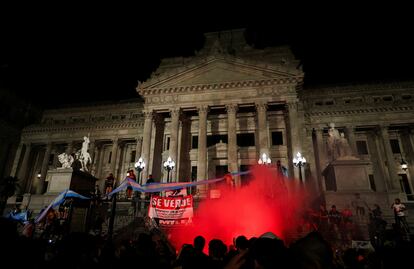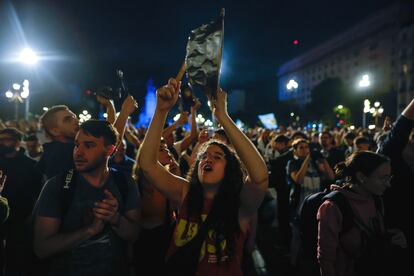Javier Milei’s decree to scale back the State faces long obstacle course in Argentina’s Congress
Prominent jurists warn that the text is unconstitutional because the president is assuming legislative powers with an all-or-nothing gamble that he did not negotiate with anyone


Early on Thursday, the financial markets celebrated Javier Milei’s decree deregulating Argentina’s economy in one blow. The shares of local banks registered increases of up to 13% on the Buenos Aires stock market, sovereign bonds in dollars traded higher on Wall Street and the country risk fell almost 40 points. But the optimism deflated as the day progressed and dark clouds grew on the horizon: the decree must now overcome a complex obstacle course in parliament. The resistance encountered in Congress, in the justice system and in the streets could frustrate the president’s plans to dismantle the State through hundreds of repeals and regulatory changes.
“The first interpretation should be positive. However, given that there are many sectors that will file complaints before the courts, the question about sustainability remains latent,” stressed the Adcap financial group. Other stock market operators initially applauded the pro-market spirit of the new regulations, but also moderated their enthusiasm while awaiting the reaction of legislators and judges, who have the final say. For now, it is clearly adverse, but history is on Milei’s side: every president of Argentina of the last few decades has signed urgent decrees, and even though many of them were controversial, none of them were struck down by Congress.
Decrees of Necessity and Urgency (DNU) are an exceptional constitutional mechanism regulated since 1994. In a scenario of a natural or social disaster, they allow the executive to implement or modify laws to address an urgent matter that cannot wait for debate in Congress. Among constitutional lawyers there is a consensus that this is not the case of the decree signed on Wednesday by Milei, which includes reforms that are neither necessary nor urgent. They say that the president assumed powers that correspond to the legislative branch, a criticism that has been echoed by a large part of the opposition.
Milei won with 56% of the votes in the presidential election runoff. He was supported by more than 14 million Argentines who wanted a change of course that would take the economy out of a decade of stagnation, increased poverty and inflation. But his behavior in the first days of government has raised alarm bells throughout the entire institutional system. “The decree violates practically everything. Even if you like the content, what fails here is the form,” condemns constitutional law professor Daniel Sabsay.

Among the more than 300 measures decreed by the far-right president, a few stand out: the prohibition on the State intervening to control the prices of food, basic goods, rent and private health insurance, leaving those decisions in the hands of entrepreneurs and landlords. Public companies may be privatized, football clubs converted into public limited companies, and foreigners will no longer have a limit on purchasing land in Argentina. Contracts will be accepted both in Argentine pesos and in any other currency.
From now on, it will be much more difficult for workers to strike and much easier for them to get fired. On the other hand, the outlook improves for employers: no one will fine them if they hired employees irregularly or if the latter put in 12-hour work days. Banks will be able to hide credit card fees from their clients, and the national industry will no longer be protected by tariffs.
Democratic risk
“Governing in this way, democracy is in danger,” warns the lawyer and jurist Roberto Gargarella, who opposes the restrictions imposed on the right to protest and who considers this mega-decree unconstitutional. Gargarella emphasizes that any government must comply with the law, whether it likes it or not, and he is surprised that a president who came to power with a parliamentary minority and without union support has signed a decree of such magnitude without first negotiating it. “There are many legislators who could agree with part of the text, but it has generated a lot of anger that it went right over Congress,” he says.
The leftist Peronist movement, now in the opposition, has expressed a total rejection of the text. “This is a policy of surrendering the country that benefits 10 individuals, there is not the slightest consideration for the people,” declared the head of the Peronist bench in the Senate, José Mayans. The criticism is also forceful from the moderate sector of the conservative coalition Together for Change. “Not like this,” Horacio Rodríguez Larreta wrote on social media. The former mayor of Buenos Aires and former presidential candidate stressed that Argentina needs profound reforms, but “they will only be successful if they can be sustained over time, and if they have legal and constitutional foundations that guarantee their implementation.”

Majority of both chambers
The legislative branch will be voting on the entire DNU. It’s an all-or-nothing gamble. To repeal it would require the negative vote of the majority of both chambers. It is enough for one of them to vote in favor or even not to deal with it at all for the decree to remain in force, according to the regulations imposed during the Kirchner administration in 2006. None of the presidential decrees signed since then have been repealed in Congress, but Milei’s could be an exception, according to Gargarella: “The move has been so provocative, so lacking in seeking agreements with anyone, that for the first time in history it is possible for the two chambers to come together in the repeal of a decree.” Even so, he believes that it is possible that it will pass this test, and that it will instead get struck down by the justice system. “In judicial terms, this will be annulled as soon as possible, especially in light of the court’s jurisprudence.”
“Without a doubt it is going to be judicialized,” agrees the lawyer, judge and politician Ricardo Gil Lavedra. Unlike the political route, which must treat the decree as a whole, the judicial route can divide it into pieces. Gil Lavedra is convinced that in the coming days numerous filings will be made by the various affected groups before the Argentine courts. Initial rulings may be appealed to a higher court and so on until the Supreme Court, in a journey that could take months, even years. The highest court does not have deadlines to issue its rulings, he warns. High judicial sources consulted by EL PAÍS also rule out that the Court might resort to legal shortcuts such as per saltum to issue its decisions as soon as possible.
“What gives predictability to a system is compliance with the Constitution. It is very important that everything is done within the framework of the Constitution and this decree escapes those parameters,” laments Gil Lavedra. Along the same lines, the constitutional law expert Andrés Gil Domínguez believes that the emergency situation defended by the executive is not sustainable. On the contrary, he believes that it is a decree “that affects the division of powers” and seeks to “impose a political project.”
Political and judicial obstacles may increase if the incipient citizen protests grow. On Wednesday night, thousands of people staged a spontaneous protest, banging pots and pans in rejection of the measures announced by Milei. First they went out to the central avenues of many cities in Argentina and later they gathered at the doors of Congress, in Buenos Aires. This Thursday and Friday there were new protests scheduled against the government, but on Saturday the roles will be reversed and the streets will belong to those who defend the decree. The polarization of Argentine society, less than two weeks after Milei took office, is more extreme than ever.
Sign up for our weekly newsletter to get more English-language news coverage from EL PAÍS USA Edition
Tu suscripción se está usando en otro dispositivo
¿Quieres añadir otro usuario a tu suscripción?
Si continúas leyendo en este dispositivo, no se podrá leer en el otro.
FlechaTu suscripción se está usando en otro dispositivo y solo puedes acceder a EL PAÍS desde un dispositivo a la vez.
Si quieres compartir tu cuenta, cambia tu suscripción a la modalidad Premium, así podrás añadir otro usuario. Cada uno accederá con su propia cuenta de email, lo que os permitirá personalizar vuestra experiencia en EL PAÍS.
¿Tienes una suscripción de empresa? Accede aquí para contratar más cuentas.
En el caso de no saber quién está usando tu cuenta, te recomendamos cambiar tu contraseña aquí.
Si decides continuar compartiendo tu cuenta, este mensaje se mostrará en tu dispositivo y en el de la otra persona que está usando tu cuenta de forma indefinida, afectando a tu experiencia de lectura. Puedes consultar aquí los términos y condiciones de la suscripción digital.








































